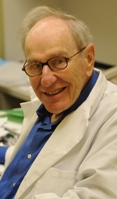
The "Morris Goodman, Ph.D., Distinguished Professor Molecular Phylogenetics & Evolution Memorial Symposium" will take place Oct. 3 on the campus of the Wayne State University School of Medicine.
The symposium, presented by the Wayne State University School of Medicine, the WSU Center for Molecular Medicine and Genetics, and the WSU Department of Anatomy and Cell Biology, honors longtime School of Medicine Professor Morris Goodman, Ph.D., who died at the age of 86 in November 2010.
Dr. Goodman, a distinguished professor of Anatomy and Cell Biology, and professor of Molecular Medicine and Genetics, is known worldwide for his research in molecular evolution and molecular systematics. His original and innovative research created the foundations for molecular phylogenetics, a new and important scientific field that employs protein and DNA sequences to decipher the course of evolution of humans and other species. In becoming a leading scientist pursuing molecular studies of evolution, Dr. Goodman set forth seminal ideas about the processes and patterns of molecular evolution.
In 1962, his assertion that chimpanzees and gorillas are genetically more closely related to humans than to other apes, and thus should be placed in family Hominidae rather than Pongidae, sparked debate. However, his research based on molecular evidence has since been generally accepted, including a later discovery from DNA sequences that chimpanzees and humans are more closely related to each other than either is to gorillas or other apes.
The symposium will take place from 8:30 a.m. to 5:30 p.m. in the Margherio Family Conference Center in the Mazurek Education Commons.
Speaker and topics scheduled to present include:
Chi-hua Chiu, Ph.D., Department of Anthropology, Kent State University, will present "Molecular evolution of the oxytocin neuropeptide system in New World monkeys." Dr. Chiu is a former student of Dr. Goodman's and a graduate of the Center for Molecular Medicine's MBG Ph.D. Program.
John Gatesy, Ph.D., Department of Biology, University of California Riverside, will present "Whale phylogeny: A diversity of evidence."
Lawrence Grossman, Ph.D., professor of Molecular Medicine and Genetics and the Henry L. Brasza director of the WSU Center for Molecular Medicine and Genetics, Wayne State University School of Medicine, will present "From mitochondria to the brain."
Wen-Hsiung Li, Ph.D., Department of Ecology and Evolution, The University of Chicago, will speak on "Using gene duplication patterns to characterize the evolution of C4 photosynthesis in plants."
Dr. Naruya Saitou, National Institute of Genetics, Mishima, Japan, will present "Phylogenetic networks as default representation of nuclear DNA sequence phylogeny."
Dr. Bernd Schierwater, Department of Ecology and Evolution, University of Veterinary Medicine, Hanover, Germany, will present "Origins of Metazoa."
Chet Sherwood, Ph.D., Anthropology Department, George Washington University, Washington, D.C., will speak on "Evolution of the human neocortex."
Jay Storz, Ph.D., School of Biological Sciences, University of Nebraska, will present "Gene duplication, genome duplication, and the diversification of vertebrate globins."
Soojin Yi, Ph.D., School of Biology, Georgia Institute of Technology, will present "Slowly evolving humans and neutral mutations."
Anne Yoder, Ph.D., Department of Biology & BAA, Duke Lemur Center, Duke University, will present "The Evolutionary History of Lemurs, and What Morris Goodman taught me about Science."
There is no cost to attend the symposium, but attendees are asked to RSVP for a headcount to please contact Derek Wildman, Ph.D., at 313-577-1253 or mpe@wayne.edu. A reception will immediately follow the symposium.